- Home
- Alison Kent
The Bane Affair
The Bane Affair Read online
BRAVA BOOKS are published by
Kensington Publishing Corp. 850 Third Avenue New York, NY 10022
Copyright © 2004 by Alison Kent
All rights reserved. No part of this book may be reproduced in any form or by any means without the prior written consent of the Publisher, excepting brief quotes used in reviews.
All Kensington titles, imprints and distributed lines are available at special quantity discounts for bulk purchases for sales promotion, premiums, fund-raising, educational or institutional use.
Special book excerpts or customized printings can also be created to fit specific needs. For details, write or phone the office of the Kensington Special Sales Manager: Kensington Publishing Corp., 850 Third Avenue, New York, NY, 10022. Attn. Special Sales Department. Phone: 1-800-221-2647.
Brava and the B logo Reg. U.S. Pat. & TM Off.
ISBN 0-7582-0668-2
First Kensington Trade Paperback Printing: October 2004
CLS 10 9 8 7 6 5 4 3 2 1
Printed in the United States of America
To Walt.
You always said I could.
And I did.
I love you.
Acknowledgements
Listing everyone who offered support and encourage-ment during the writing of this book would take as many pages as the story. I'll synopsize instead.
I owe the biggest thank-you of all to the most brilliant Kate Duffy, a goddess among editors, for believing that I could deliver on an idea unlike any I'd written before.
Additionally, I give credit to Karen Solem for the subtle-and not-so-subtle nudges that pushed me out of my comfort zone.
As always, Jan Freed reminded me that God is in the details.
This time around Jill Shalvis, Shannon McKenna and the Namumis provided the reads I needed, along with the hugs, laughter, and unmentionables that saw me through to the end.
Mike Stone provided much of the technical input. Any mistakes are my lay interpretation. And John Carbonaro came up with a B movie just when I needed one.
I thank all of you very much.
"The only thing necessary for the triumph of evil is for good men to do nothing."
—Edmund Burke (1729-1797) Irish philosopher, statesman
Prologue
A fine horse, a fine cigar, a fine woman.
Two outta three wasn't half bad.
With a stopwatch dwarfed by his meaty left palm, Hank Smithson chomped down on the butt of a Montecristo Corona Grande and watched Maddy Bar None fly. The mare hit the quarter-mile mark; Hank hit the stopwatch, and hard. He rolled the cigar to one side of his mouth, rolled it back. The thud of the horse's hooves beat at the base of his skull.
Unbelievable. Dad-blamed unbelievable.
He grinned, watching as she slowed, as she tossed her head and sashayed her fine chestnut ass around the back side of the track. He glanced again at the time on the stopwatch, shaking his head, disbelieving. Life didn't get much better than this. Not to his way of thinking. Making it better wouldn't be possible without giving him Madelyn back—a thought that had his grin fading, that never failed to hit him where his heart refused to heal. She'd been a good woman, his Madelyn, and he missed her more every day.
The acres of prime Saratoga County pastureland beyond the barns and the track remained Crayola crayon green but for spatters of red-gold, orange-gold, and yellow-gold leaves blowing in from the wooded hills beyond. A chill was coming. He felt it in bones that were growing brittle, in joints that were sorely in need of a good slowing down.
Thing was, slowing down had never been much in his blood. Madelyn had known that, had lived with that, and with him, for forty-one years. His boys knew that, too; every time he took on one of his SG-5 team's jobs, they threatened to hog-tie and sling him up in MaddyB's barn until the horse was too old to race.
That was when he reminded them who had nipped a couple of their courts martial in the bud, who had buried the dishonorable truth of a discharge or two. Or, in the Bane boy's case, who it was that had ponied up a future of honky-tonk bars and biker bars and sushi bars instead of the bars seen from the wrong side of a Thai prison.
Funny thing the way all those governmental special forces and their covert ops could get a man into trouble, yet none of 'em seemed to be able to find their asshole with a flashlight when it came to getting him out.
Hank didn't for half a second cotton to all that mission-critical, sealed-lips, country-first bullshit. The men always came first. Always. And that wasn't talking out of his ass. He'd done his time. Little places like Korea and Vietnam. Even served up a few off-the-record words of advice to Norman during Desert Storm.
Bottom line was, if there was no man, there was no country. At least to Hank's way of thinking.
MaddyB continued prancing, tail flagging, nostrils flaring. And then his own ears pricked, and at the sound of heavy boots crunching gravel behind him, he pocketed the stopwatch. Catching his unlit cigar between his fingers, he leaned into the practice track's railing, listened to the boy's approach, and figured it was time he stopped thinking of his SG-5 team as boys.
They were men, elite operatives who had served their country and served her well, yet were nameless and faceless and sharper than a tack knew how to be.
It was Hank's own soul-deep patriotism, his love for the land he'd risked his life to defend, that had driven him to put together the five-man Smithson Group in the first place. Discreet inquiries had taken him from military courtrooms to jungle prisons, searching for the type of man who would boldly go where law-abiding, rule-stickling, by-the-bookers wouldn't, and get done what needed to get done.
He'd hand picked all of 'em. And it hadn't taken a one of the five long to learn not to use their sneaky hush-hush shit on ol' Hank, no matter that he'd been around for three-quarters of a century. Now they let him know they were comin', fully appreciative of his own dodgy experience in the Pacific Theater beneath Westmoreland and Krulak.
And hell if he wouldn't give his right nut to turn back the clock about twenty years. He was tired of being tied out here to the farm. Or worse, to Smithson Engineering's offices in the city. Fuck the money the corporation generated, money that provided the horses and cigars, that would've provided the women had he an itch left to scratch. Doin' nothing was no way for a man to live out his life.
Ten more seconds of gravel-crunching and Christian Bane braced a boot on the lowest rung of the split rail fence, draping his forearms along the top and turning his intense gaze in MaddyB's direction. Hank shifted his bum hip to the side and took a moment to study the profile of the boy who was the quietest member of the team.
The one Hank had chosen first.
Taciturn wasn't the right word. Christian plain didn't have a whole lot to say. And that was fine. More than fine. Hell, Hank had known big talkers who never said anything worth listenin' to. At least with Christian, when he talked, a man knew to pay attention. Though Hank did wonder a bit if the boy's tendency to hang back and not speak until spoken to made him the right one for this job.
It wasn't going to be an easy lap around this particular track, impersonating Peter Deacon, the puppet doing the dirty work for the syndicate known as Spectra IT. Pulling it off believably put a whole lot of conversation—and other not so nice doings—in Christian Bane's future.
Looking out towards MaddyB as her trainer led her to the stables, Hank broke the silence by clearing his throat. "No passport this time, son. Figured that should make you happy." He narrowed his eyes, glanced to the side, waited for Christian's reaction. And there it was. That slow upward tilt of the right side of his mouth. "Matter of fact, you don't even have to leave the state. Couple of county lines is all."
And at that, Christian stepp
ed back from the fence and turned. "I'd say that's the best news I've had in awhile, but I know you way too well."
He was a tall man, topping Hank's own five foot eleven by about three inches. 'Course, Hank had once been a bit taller himself, dad-blamed bum hip. He had to say he liked the military haircut Christian wore even if the beard stubble wasn't quite as clean-looking. And his eyes . . . yep. They were the same ones Hank had felt that day seven years ago like darts blown into his skin as the boy stared out from behind those bars deep in the jungle of northern Thailand's Chiang Rai province.
Spectra IT had put him there, had left him to die there, which made this whole affair one Hank wasn't thrilled about having to involve Bane in.
At Hank's continuing silence, a look came over Christian's face, a look speaking of the things he'd seen that no man should have to, drawing down his brows in that way he had of frowning so fiercely that even Hank considered taking a step back. Christian shook his head slowly, pulling in a deep breath as he cast down his gaze, shoved his hands to his hips, and braced against the coming blow.
It was when he looked back up that Hank stopped worrying. For all the boy didn't speak with his mouth, he said enough with his eyes. And it was those eyes Hank wasn't looking forward to answering to.
He'd take that look, that haunted look, that hunted look, all the way to his grave. He'd take it because even knowing what he did about Christian's history with the dragon, Hank was still sending him deep into the beast's lair.
So when Christian finally asked, "It's Spectra, isn't it?" Hank nodded and answered, "They're holding another innocent man hostage. I need you to go in and get him out."
And nothing more was said.
One
Gothic mansion or gingerbread house.
Natasha Gaudet had never been able to decide.
Each time she approached her employer's home, an estate set on ninety-eight acres near Lake Placid in New York's Adirondack State Park, she was struck with the fanciful idea that she was entering an amusement park. Or a wickedly haunted house.
By daylight, the three-story structure twinkled as if sugared with white frosting, shingled with red gumdrops, and shuttered with slats of blue lollipops. The beds of peppermint geraniums scattered throughout the yard of green candy sprinkles provided the finishing touch. Alice would have thought it a wonderland. Gretel would have thought it dessert. Natasha simply thought it a hell of a lot of fun.
But after dark, shadows crept about with a menacing presence, turning the fairy-tale castle into a hulking creature whose hideous fangs gleamed in the yawning maws of its dormer windows, whose aura of evil pulsed from the depths of its sinister lair. Of course that was because Natasha had a ridiculously vivid imagination and rather enjoyed the idea of being at the mercy of such a villainous beast.
The fact that her employer, Dr. Wickham Bow, was also her godfather made the entire experience of working as his personal assistant the best of her life. Or at least a close runner-up, she decided, switching the headlights of her luxury SUV to bright, because nothing would ever compare to being a child and sitting at the feet of Wick and her father—even if where she'd really been sitting had been one floor above.
Vividly, she remembered sneaking out of her bedroom, gripping the railing that edged the landing, and pressing her face between the spindles. Her mother's television had blared from behind the closed door at the hallway's end, purposefully drowning out the very voices Natasha had stayed awake to hear. The voices of Wick and her father, boisterous with brandy and good conversation.
They'd talked of politics. Of religion. Of inter--national affairs and the condition of the greenhouse flowers. More often than not, she'd fallen asleep there on the pillow she'd brought with her, waking only when her father cradled her in his arms and carried her to bed. Having tucked her in, he then retired to his own room at the opposite end of the second floor from where her mother slept. Even as a child who knew nothing about matters of the heart or the bedroom, her parents' estrangement had saddened her.
The one thing she was most thankful for—though she hadn't recognized the blessing until years had passed—was that neither parent had ever used her as a pawn, allowing her to remain close to both. As divorces went, theirs had been amicable, her mother raising no objections when, though only eleven, she had chosen to live with her father. To move with him, in fact, from their Boston home to New York City, where he had taken a job with NYC Department of Education.
Michael Gaudet had been blessed with the need to nurture—a trait which had made his passing five years ago so very hard to take. Unable to bear her grief, Wick had stepped in and offered her a job as well as a home. He'd allowed his love for her—his one seeming weakness—to override his life's tenets. This, the very same Dr. Wickham Bow, who expected everyone around him to be self-sufficient, short on emotion, long on logic, and free of any misplaced compassion for others.
After all, the formula had been the very one that had taken him from the South Bronx of the late sixties to Polytechnic as a tenured professor, and then to the global community of scientists and educators as a respected authority in his field of computer science. He was no different now than he'd been during those years she'd listened to him challenge her father on Buddhism and Vietnam and the grafting of hibiscus.
He was simply older, more deeply set in his ways, a bit of a curmudgeon—especially when crossed—yet she adored him without measure. And though she stayed two or three nights a week at his estate as work and his declining health demanded, she spent most of her time in her apartment on Manhattan's Upper West Side.
Making the final turn from the long private road off of Route 86 and through the property's gates, Natasha slowed her Infiniti FX45—oh, but she loved the extravagant toy—and made her way around to the back of the house, pulling to a stop next to the modified van that allowed Wick to drive when he chose.
He rarely chose. He preferred to remain underground, working in his state-of-the-art computer lab, or holding court in the lecture theater from which he broadcast via satellite, interacting with his grad students and research assistants, instead of communing with the general population or the great outdoors. For the former, he relied on his household staff. For the latter, well, he never had been much for nature.
She sighed, climbed from her SUV, and stretched before gathering up her suit jacket and the endless work and correspondence she'd brought from the university. She'd present it all to him at tomorrow morning's breakfast meeting, which meant organizing and prioritizing the bulk of it tonight. Definitely a long evening ahead.
Halfway up the inclined walkway from the garage to the back of the house, she stopped.
And turned. And frowned.
Angling her computer bag's wheels on the slanted ramp, she set down her purse and the expanding files she carried, and draped her jacket over the telescoped handle. Her heels clicked sharply as she made her way back along the smooth sidewalk that appeared as an extension of the water garden between the house and garage.
Wick had a visitor. She'd been so self-absorbed that only her subconscious had noticed the low-slung import parked on the near side of her godfather's van. Upon closer inspection— because she had this thing for hot-bodied cars—she realized Wick had a very wealthy visitor.
She circled the Ferrari once, shaking her head and grinning like a besotted fool, leaning down to peer unsuccessfully through the driver's side window. Neither the light from the garage spotlight nor that from the moon was a match for the dark tint. No big deal, really, because she wanted to see the interior only half as much as she wanted a good look beneath the glass cover over the rear engine bay.
She made her way around the car slowly, fingers digging into her palms instead of testing the sleek surface of the composite and metal as she wanted to do. What she didn't want to do was set off the alarm. So at the two sharp shrieks of said alarm being deactivated, she jumped back, hand to her throat, pulse thundering. The
rumble in her ears took long seconds to quiet.
Once it had, she blew out a breath, hearing footsteps, a slow but certain approach from behind. Footsteps, yet no familiar voice calling out to her to set her mind at ease. The owner of the car; it had to be. Busted by her own curious nature, Natasha turned.
The man she assumed to be Wick's visitor was tall and lean and frighteningly attractive—frightening, because the intensity of his gaze was not the least bit dimmed by the darkness or the. shadows. If she'd been the type to shiver, her Jimmy Choos would not have been the best choice of footwear. The way he was looking at her? Looking into her? Looking through what she showed the world for what she might be hiding? She would have shaken out of her shoes by now.
He had to have come from the water garden. Perhaps he'd seen her stop on the walkway. The garden took up a good eight hundred square feet, and any number of the benches along the water's edge, as well as at least two Natasha could think of nestled deeper into the lush foliage, offered a perfect view of the path rising from the garage to the house.
Approaching from that direction gave him the advantage. She stood in the full fall of moonlight, yet all she could see was his eyes.
Well, that and his build, which had a lot to do with the buzz of energy sizzling at her nape. Hot-bodied cars. Hot-bodied men. Both hit her right where it counted. He drew closer, and she waited, her gaze taking in his long legs and his stride that made clear he was in no hurry.
He wore black dress pants and boots. Ostrich, she decided, as the leather appeared distressed rather than the gloss more natural to crocodile. Pricey boots, she knew, because footwear ran a close second to her love for cars. His shirt was dress white, with collar open and cuffs rolled to mid-forearm. He'd tossed his suit coat over his right shoulder and held it there hooked on his thumb.

 Beneath the Patchwork Moon (A Hope Springs Novel Book 2)
Beneath the Patchwork Moon (A Hope Springs Novel Book 2) The Second Chance Café (A Hope Springs Novel Book 1)
The Second Chance Café (A Hope Springs Novel Book 1) The Sweetness of Honey (A Hope Springs Novel Book 3)
The Sweetness of Honey (A Hope Springs Novel Book 3) The You I've Come To Know (A Mother's Love Book 1)
The You I've Come To Know (A Mother's Love Book 1) The You I'll Love Forever
The You I'll Love Forever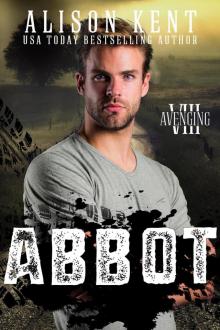 Abbot
Abbot The You I Want For Life (A Mother's Love Book 2)
The You I Want For Life (A Mother's Love Book 2) The You I've Come to Know
The You I've Come to Know The Comfort of Favorite Things (A Hope Springs Novel Book 5)
The Comfort of Favorite Things (A Hope Springs Novel Book 5) The You I Want for Life
The You I Want for Life Hope for the Holidays: a Christmas novella (A Hope Springs Novel Book 6)
Hope for the Holidays: a Christmas novella (A Hope Springs Novel Book 6) Bliss and the Art of Forever (A Hope Springs Novel Book 4)
Bliss and the Art of Forever (A Hope Springs Novel Book 4) Play Me (Barnes Brothers Book 2)
Play Me (Barnes Brothers Book 2)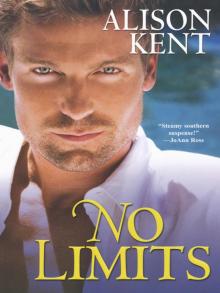 No Limits
No Limits Love in Bloom
Love in Bloom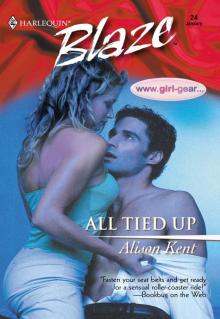 All Tied Up
All Tied Up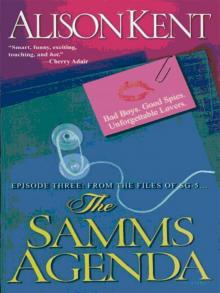 The Samms Agenda
The Samms Agenda The Second Chance Café
The Second Chance Café One-Click Buy: March 2009 Harlequin Blaze
One-Click Buy: March 2009 Harlequin Blaze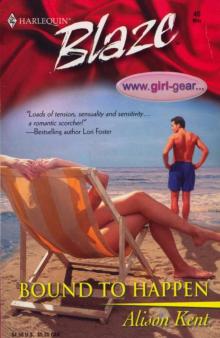 BOUND TO HAPPEN
BOUND TO HAPPEN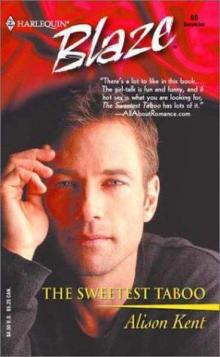 The Sweetest Taboo
The Sweetest Taboo The Second Chance Café (A Hope Springs Novel)
The Second Chance Café (A Hope Springs Novel)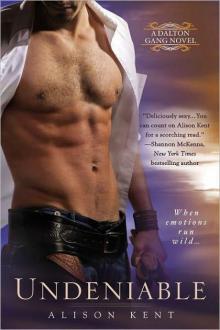 Undeniable
Undeniable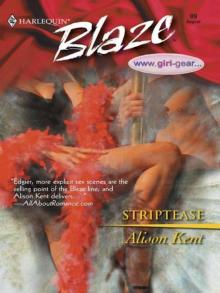 Striptease
Striptease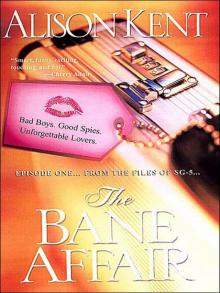 The Bane Affair
The Bane Affair At His Mercy
At His Mercy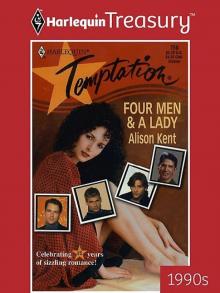 Four Men & A Lady
Four Men & A Lady The Comfort of Favorite Things (A Hope Springs Novel)
The Comfort of Favorite Things (A Hope Springs Novel)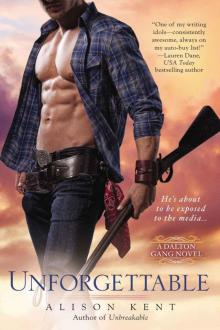 Unforgettable (The Dalton Gang #3)
Unforgettable (The Dalton Gang #3)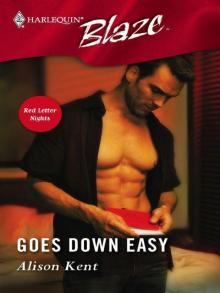 Goes down easy: Roped into romance
Goes down easy: Roped into romance Holiday Kisses: A Rare GiftMistletoe and MargaritasIt's Not Christmas Without YouThis Time Next Year
Holiday Kisses: A Rare GiftMistletoe and MargaritasIt's Not Christmas Without YouThis Time Next Year No strings attached
No strings attached Playing Love's Odds (A Classic Sexy Romantic Suspense)
Playing Love's Odds (A Classic Sexy Romantic Suspense)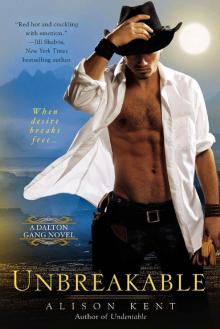 Unbreakable
Unbreakable Red Hot Holiday Bundle
Red Hot Holiday Bundle Kiss & Makeup
Kiss & Makeup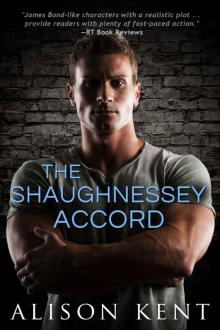 The Shaughnessey Accord
The Shaughnessey Accord Larger Than Life
Larger Than Life Call Me: sold live on CBS 48 Hours (Barnes Brothers Book 1)
Call Me: sold live on CBS 48 Hours (Barnes Brothers Book 1) With Extreme Pleasure
With Extreme Pleasure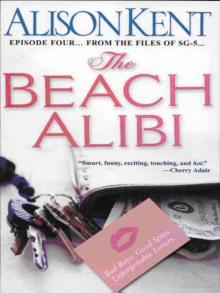 The Beach Alibi
The Beach Alibi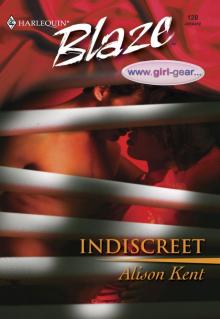 Indiscreet
Indiscreet The Sweetness of Honey (A Hope Springs Novel)
The Sweetness of Honey (A Hope Springs Novel)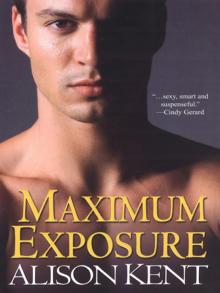 Maximum Exposure
Maximum Exposure